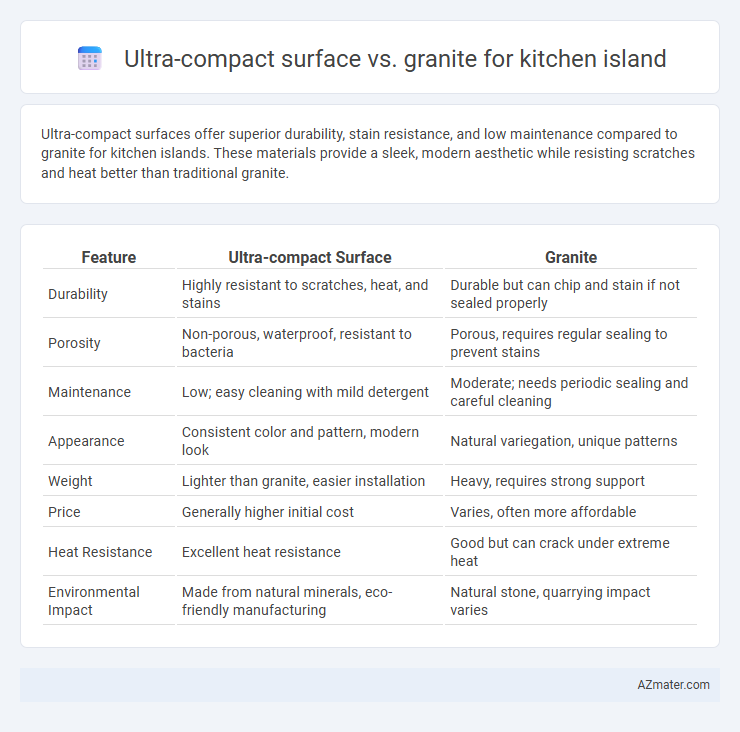Ultra-compact surfaces offer superior durability, stain resistance, and low maintenance compared to granite for kitchen islands. These materials provide a sleek, modern aesthetic while resisting scratches and heat better than traditional granite.
Table of Comparison
| Feature | Ultra-compact Surface | Granite |
|---|---|---|
| Durability | Highly resistant to scratches, heat, and stains | Durable but can chip and stain if not sealed properly |
| Porosity | Non-porous, waterproof, resistant to bacteria | Porous, requires regular sealing to prevent stains |
| Maintenance | Low; easy cleaning with mild detergent | Moderate; needs periodic sealing and careful cleaning |
| Appearance | Consistent color and pattern, modern look | Natural variegation, unique patterns |
| Weight | Lighter than granite, easier installation | Heavy, requires strong support |
| Price | Generally higher initial cost | Varies, often more affordable |
| Heat Resistance | Excellent heat resistance | Good but can crack under extreme heat |
| Environmental Impact | Made from natural minerals, eco-friendly manufacturing | Natural stone, quarrying impact varies |
Ultra-Compact Surface vs Granite: Kitchen Island Showdown
Ultra-compact surfaces outperform granite in durability and maintenance for kitchen islands, offering superior resistance to scratches, stains, and heat. Granite requires periodic sealing and can chip or crack over time, whereas ultra-compact materials like Dekton or Lapitec provide consistent color and texture without porous issues. These engineered surfaces deliver a sleek, modern aesthetic alongside exceptional longevity, making them a preferred choice for high-traffic kitchen islands.
Durability Face-Off: Ultra-Compact Surface vs Granite
Ultra-compact surfaces, composed of advanced sintered materials, offer superior resistance to scratches, heat, and stains compared to traditional granite, making them highly durable for kitchen islands. Granite, a natural stone, provides robust durability and heat resistance but can be prone to chipping and requires periodic sealing to prevent stains and damage. The ultra-compact surface's non-porous nature and engineered strength often result in a longer-lasting, low-maintenance kitchen island compared to the slightly more porous and maintenance-intensive granite.
Appearance & Design Flexibility: Choosing Your Style
Ultra-compact surface offers sleek, modern aesthetics with a wide range of colors, textures, and patterns that mimic natural stone or concrete, providing exceptional design flexibility for kitchen islands. Granite presents a timeless, natural stone appearance with unique veining and color variations, lending character and luxury to any kitchen space. Ultra-compact surfaces allow for thinner, lighter slabs and seamless edge profiles, enabling innovative island shapes and minimalist styles compared to the bulkier, heavier granite slabs.
Heat, Scratch, and Stain Resistance Compared
Ultra-compact surfaces outperform granite in heat resistance, withstanding higher temperatures without damage due to their dense, non-porous composition. Scratch resistance is significantly better in ultra-compact materials, which resist abrasions more effectively than granite's natural stone surface. Stain resistance is superior in ultra-compact surfaces since they lack the porous structure of granite, making them less prone to absorbing oils, acids, and other staining agents common in kitchen environments.
Maintenance Requirements: What Homeowners Should Know
Ultra-compact surfaces offer superior resistance to stains, scratches, and heat, requiring minimal maintenance compared to granite, which demands regular sealing to prevent porous damage and staining. Homeowners should note that ultra-compact materials are non-porous, making them more hygienic and easier to clean with just mild soap and water. Granite's natural stone composition necessitates periodic professional sealing and careful cleaning to maintain its appearance and durability over time.
Installation Process: Ultra-Compact Surface vs Granite
Ultra-compact surfaces offer a streamlined installation process due to their lightweight nature and uniform thickness, allowing for easier handling and quicker fitting compared to granite. Granite installation requires precise measurement, heavy lifting, and careful sealing to prevent damage, often extending labor time and costs. The reduced need for complex cutting and finishing with ultra-compact materials translates to less downtime and lower installation expenses for kitchen islands.
Cost Analysis: Budgeting for Your Kitchen Island
Ultra-compact surfaces often present a cost-effective solution compared to granite for kitchen islands, with prices typically ranging from $50 to $70 per square foot, whereas granite can cost between $60 and $100 per square foot depending on quality and origin. Installation fees for ultra-compact materials tend to be lower due to their lighter weight and ease of handling, reducing overall labor costs. Long-term maintenance expenses favor ultra-compact surfaces as they resist staining and require minimal upkeep, unlike granite, which may need periodic sealing and professional polishing.
Environmental Impact and Sustainability
Ultra-compact surfaces are composed of natural minerals and resins, offering high durability with low environmental impact due to their long lifespan and recyclability. Granite, while natural and aesthetically appealing, requires energy-intensive quarrying and transportation, contributing to a larger carbon footprint. Choosing ultra-compact surfaces supports sustainability through eco-friendly manufacturing processes and reduced resource extraction compared to granite.
Popular Brands for Ultra-Compact and Granite Surfaces
Ultra-compact surfaces for kitchen islands are prominently offered by brands like Dekton by Cosentino, Neolith, and Lapitec, known for their durability, stain resistance, and sleek aesthetics. Granite remains a classic choice with popular suppliers such as MSI, Arizona Tile, and Granite Gold, prized for natural stone's unique patterns and heat resistance. Selecting between ultra-compact surfaces and granite often depends on balancing modern technology with natural beauty, considering brand reputation and performance features.
Which Is Best for Kitchen Islands: Expert Recommendations
Ultra-compact surfaces offer superior resistance to heat, scratches, and stains compared to granite, making them highly durable for kitchen islands. Granite provides a natural, unique aesthetic with high thermal resistance but requires regular sealing to maintain its quality. Experts often recommend ultra-compact surfaces for low-maintenance and longevity, while granite remains a preferred choice for those valuing natural stone beauty.

Infographic: Ultra-compact surface vs Granite for Kitchen island
 azmater.com
azmater.com